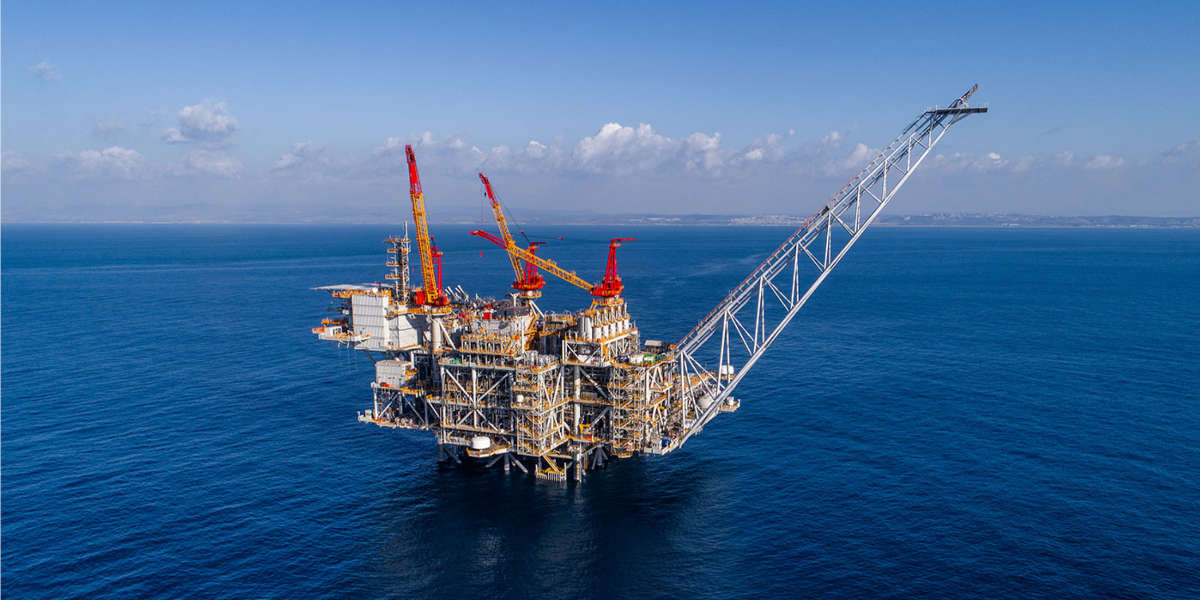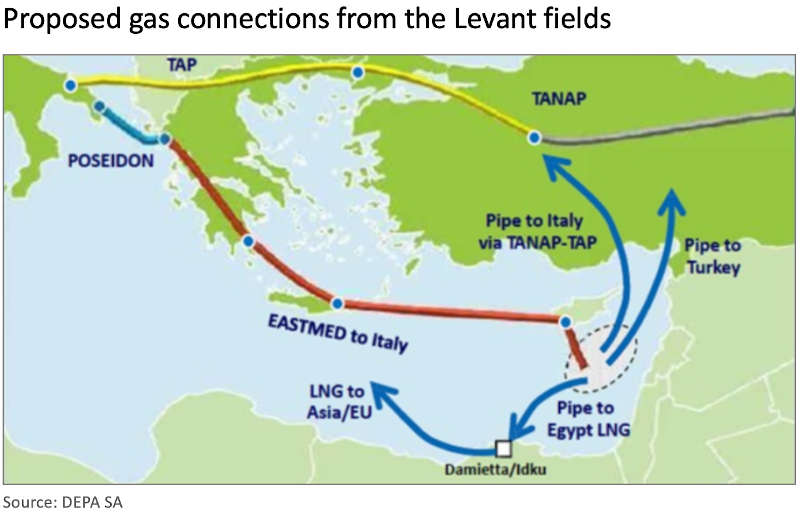In the picture
Platform in the Leviathan gas field, operated by Israel [NewMed Energy].
As if the Eastern Mediterranean region were not convulsive enough, the discoveries of gas fields made in the last thirty years in the area have provided a new source of rivalry, partly because of the new opportunities they offer. The deposits located in Cyprus (Aphrodite), Israel (Leviathan and Tamar), Egypt (Zohr) or Lebanon (Qana), together with Gaza Marine, in the coastal part of the Gaza Strip, are important because of their strategic significance, but also because of the size of their reserves. The war in Gaza, in any case, has hindered the development of the projects.
The exploitation of such important resources has aroused the interest of the main powers in the Eastern Mediterranean and has increased friction in the region as one after another projects for exploitation and the construction of gas pipelines to facilitate exports are underway. Adding to the problems associated with these operations is the conflict that has been raging in the Levant since the Hamas attack on Israel on October 7, 2023.
In 2019, and with the decisive impetus of the EU and the United States, Cyprus, Egypt, Greece, Israel, Palestine and Jordan agreed on the development of the EastMed gas pipeline within the framework of the EastMed Gas Forum organization. With a length of 2,000 km, the pipeline would provide Europe with 11 billion cubic meters of gas and reduce Europe's dependence on Russian gas, which is still in place in 2024, despite the war in Ukraine. However, the EastMed project collapsed when Biden stepped back in 2022, refusing to support it on the grounds of the frequent hostilities in the area and the high cost of the project.
Countries seeking an alliance with Europe and the United States in the EastMed framework , such as Egypt and Cyprus, were seeking the exclusion of Ankara in order to reduce their influence in the area. As might have been expected, Turkey, not at all willing to stay out of the deal, reacted to these maneuvers by signing, in November 2019, an agreement with the Libyan government of Fayez al Sarraj(GNA) to delimit their respective exclusive maritime economic zones (EEZ), which was followed, in 2020, by a motion to send troops in support of the GNA. The definition of their EEZs endowed Turkey with extensive sovereignty rights in the Eastern Mediterranean. This rattled its Greek and Cypriot neighbors. Three years later, in 2022, Turkey signed a new agreement with the Libyan GNA for offshore oil and gas exploration in Libyan waters. In 2023, the agreement was temporarily suspended by the Court of Appeal in Tripoli on legal grounds.
In 2022, the idea of an underwater gas pipeline from the Leviathan field in northern Israel to its European partners was revived. Diplomatic relations between Turkey and Israel had not been very good so far, as evidenced, for example, by Turkish President Erdogan's refusal to label Hamas as a terrorist organization in March 2024. Mutual interests weighed, for a moment, in favor of cooperation, leaving partially behind the disagreements; that same year there were negotiations between the Israeli and Turkish governments on the supply of gas to Turkey through a pipeline that, from this country, would transport it to Europe.
One of the main obstacles complicating this initiative since then has been the need to rely on the intermediation of Syria or Cyprus (depending on the pathway be followed) to transport the gas from one point to the other, since these are countries at odds with Israel and Turkey, respectively. To solve this problem and get the gas to Europe, a good solution would be to liquefy it in Cyprus and transport it from there to the continent. However, Turkey, which claims a continental shelf that reaches part of the Greek islands and northern Cyprus, argues that the pipeline would cross its Exclusive Economic Zone (EEZ) which, in this view, would give it exploitation rights, and claims to be in the equation when it comes to managing the pipeline passing through Cyprus. Turkey's foreign policy is not so well received by the Cypriot state nor by its neighbors in the Aegean Sea.
At the same time, Egypt and Israel signed an agreement in Cairo to export gas to the EU, whereby the gas will flow from the Ashkelon coast and the Tamar and Leviathan gas fields in Israel to the Egyptian town of El-Arish, in the Sinai Peninsula, through a 100 km pipeline, where it will be liquefied for transport to Europe. This project would provide Europe with an alternative to Russian gas, as well as a better diversification of suppliers. The agreement, which is valid for three years, but renewable - although renewal is unclear - provides for an increase in supply from 5,000 million cubic meters to a total of 7,000 million cubic meters.
There have been many agreements between Israel and Lebanon, Turkey, Cyprus or Greece, which, although they have not yet become binding, express a desire for cooperation in terms of gas exploitation. The American Chevron and ExxonMobil, the Italian Eni and the French Total Energies are the main companies interested in the possible cooperation project .


